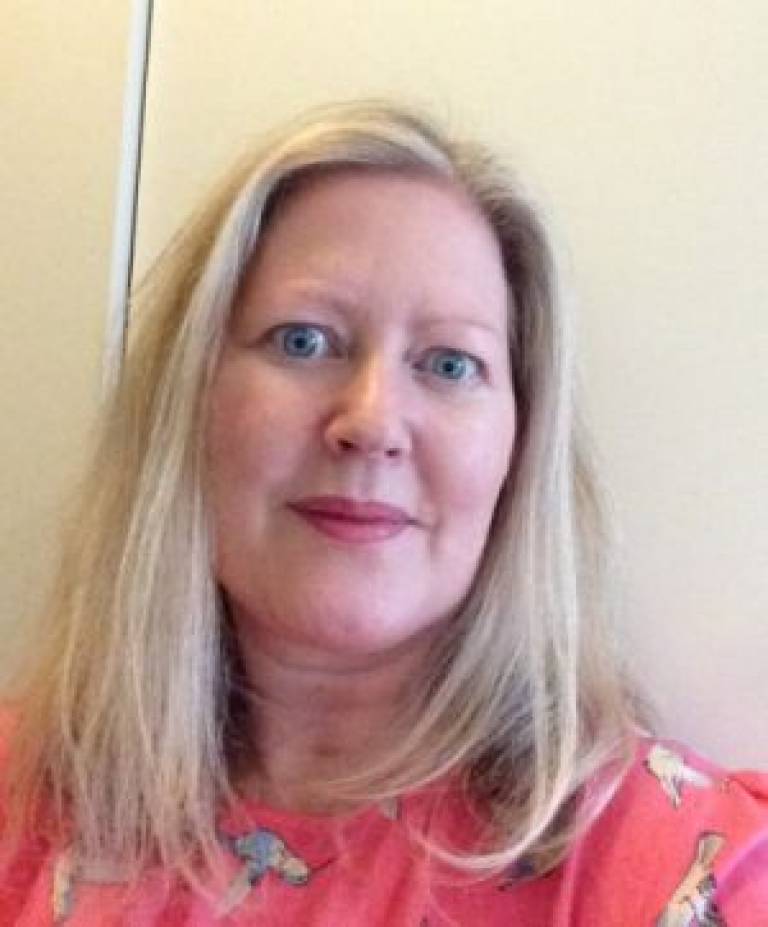Spotlight: Gill Weston
15 June 2017
Gill Weston, PhD, UCL Institute of Epidemiology and Health Care What attracted you to study your PhD at UCL? UCL has a fantastic reputation for research and is also renowned for its multidisciplinary approach.
 Furthermore, at the Institute induction session the graduate tutors were welcoming and encouraging (they still are), during the poster session, the students were enthusiastic and friendly (they still are), and my then potential (now actual) primary supervisor was (and still is) very supportive and helpful.
Furthermore, at the Institute induction session the graduate tutors were welcoming and encouraging (they still are), during the poster session, the students were enthusiastic and friendly (they still are), and my then potential (now actual) primary supervisor was (and still is) very supportive and helpful.
Why you were interested in your particular subject area? I run a corporate wellbeing consultancy and increasingly encounter workers who feel that their working patterns were having a detrimental impact on their physical and mental wellbeing. I could find little research about this, and yet I believe that evidence is needed if employers and policy-makers are to be informed about how workers and businesses can flourish together. Since starting my PhD, working patterns such as zero-hours contracts and self-employment have become a hot political issue, which spurs me on too.
What are your future goals post-graduation? I wish to continue to help workers and their organisations learn and implement ways to flourish. Whilst I intend to continue my consultancy work, I'm also keen to continue to expand the body of scientific research in this area and help gather evidence that better informs employers, politicians and civil servants. Perhaps a Postdoctoral position would be pertinent. Studying at UCL has put me in a good position to pursue this.
What do you like about your programme and why? Firstly, it's given me the opportunity and environment in which to research a subject that I feel passionate about. Additionally, I'm greatly benefiting from a team of four supervisors who are highly experienced researchers in their own right, who quickly respond to queries and requests, and with whom I have regular meetings. It's also great to be involved with a research group which shares its valued and interesting work and hosts weekly seminars - all of which tend to be stimulating and thought-provoking. I also have access to all the relevant journals/library sources online; a dedicated desk within the department; provision of a desktop computer and vital computer software, which can also be accessed remotely when I have to work from home or from a client's premises. I can attend MSc classes, department training, courses provided by the doctoral school, institute seminars, and seminars provided by the Early Career Researcher Forum. Finally, friendly, encouraging and supportive staff and colleagues make it a great place to study.
What can a student expect to learn on this course? Key skills to conduct independent research; statistics, analytical methods and how to use computer software for the analysis; the development of academic writing skills and how to submit research papers to high-impact journals; conference and seminar presentation skills. In addition, there are also opportunities to collaborate with others, especially with conference and other event organisation.
What were you doing before you became a student at UCL? I spent several years working in public affairs, sponsorship and public relations before retraining and moving into corporate wellbeing, specialising in psychological wellbeing at work. I still work in the latter.
What piece of advice would you give to new students? You get out what you put in. Develop a growth mindset. Work hard, be organised, and be open to advice, opportunities and new friends. Be supportive of others. Be mindful that others, especially your supervisors, want you to do well.
Where do you identify as home? London
Tweet Close
Close



